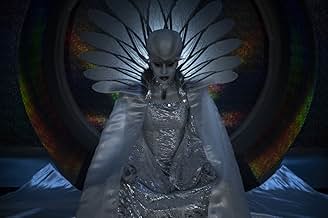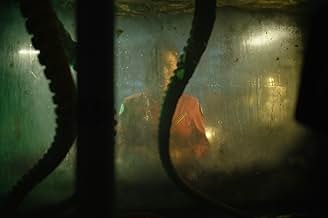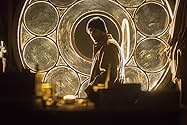Eine aktualisierte Version der klassischen Anthologie-Reihe mit verschiedenen Geschichten aus Science-Fiktion, Mystery und Horror.Eine aktualisierte Version der klassischen Anthologie-Reihe mit verschiedenen Geschichten aus Science-Fiktion, Mystery und Horror.Eine aktualisierte Version der klassischen Anthologie-Reihe mit verschiedenen Geschichten aus Science-Fiktion, Mystery und Horror.
- Für 1 Primetime Emmy nominiert
- 5 Gewinne & 13 Nominierungen insgesamt
Folgen durchsuchen
Handlung
WUSSTEST DU SCHON:
- WissenswertesAfter Unwahrscheinliche Geschichten (1959), Unbekannte Dimensionen (1985) and Twilight Zone (2002), this is the fourth "Twilight Zone" television series. There have also been two films in the franchise: Unheimliche Schattenlichter (1983) and Schrecken aus dem Jenseits (1994).
- VerbindungenFeatured in Half in the Bag: Us and Paddleton (2019)
Ausgewählte Rezension
The original Twilight Zone series was full of social commentary and messages that challenged society. With episodes touching on topics like racism, religion, censorship, greed, and corporatism, the show was far from a simple science fiction series. One might suggest the Twilight Zone started Hollywood's tradition of engaging in social and political issues.
So why did this concept work so well in the 1960s while receiving so much backlash today? The answer is simple: politics is more polarizing than it has been in recent history.
Rod Serling, the writer of the original series, set out to challenge viewers by creating content that neither the tv executives nor the regulators felt would make for a positive outcome, but they were wrong. It was a big success.
However, when revisiting old episodes, it's clear that Serling's radical approach to writing was still tame enough to appeal to most average American viewers of that era. Today, writing about social topics that make people uncomfortable while avoiding ideological backlash seems nearly impossible to do.
1964's episode "I Am the Night - Color Me Black" told the story of a town eager to hang an innocent black man after he was wrongfully convicted of killing a racist white man in self-defense. 2019's episode "Replay" tells the story of a woman using a rewind button on a camcorder to protect her son from a racist police trooper. Just read the other reviews and see how today's polarized viewer responds to the latter.
To be fair, many of the ideas conveyed by Serling's original Twilight Zone were deliberately written to not appeal to either side politically. The same probably cannot be said about this current reboot. It would be interesting to see if Serling could take on this challenge today.
Maybe the solution to this problem is to no longer use social commentary in writing. Or maybe the writers could make more obvious right leaning episodes to even things out. One thing is for certain, as long as entertainment seeks to talk about the things that make us uncomfortable, you'll manage to alienate a lot of viewers... here.... in The Twilight Zone.
So why did this concept work so well in the 1960s while receiving so much backlash today? The answer is simple: politics is more polarizing than it has been in recent history.
Rod Serling, the writer of the original series, set out to challenge viewers by creating content that neither the tv executives nor the regulators felt would make for a positive outcome, but they were wrong. It was a big success.
However, when revisiting old episodes, it's clear that Serling's radical approach to writing was still tame enough to appeal to most average American viewers of that era. Today, writing about social topics that make people uncomfortable while avoiding ideological backlash seems nearly impossible to do.
1964's episode "I Am the Night - Color Me Black" told the story of a town eager to hang an innocent black man after he was wrongfully convicted of killing a racist white man in self-defense. 2019's episode "Replay" tells the story of a woman using a rewind button on a camcorder to protect her son from a racist police trooper. Just read the other reviews and see how today's polarized viewer responds to the latter.
To be fair, many of the ideas conveyed by Serling's original Twilight Zone were deliberately written to not appeal to either side politically. The same probably cannot be said about this current reboot. It would be interesting to see if Serling could take on this challenge today.
Maybe the solution to this problem is to no longer use social commentary in writing. Or maybe the writers could make more obvious right leaning episodes to even things out. One thing is for certain, as long as entertainment seeks to talk about the things that make us uncomfortable, you'll manage to alienate a lot of viewers... here.... in The Twilight Zone.
- theendisopened
- 22. Apr. 2019
- Permalink
Top-Auswahl
Melde dich zum Bewerten an und greife auf die Watchlist für personalisierte Empfehlungen zu.
- How many seasons does The Twilight Zone have?Powered by Alexa
Details
Zu dieser Seite beitragen
Bearbeitung vorschlagen oder fehlenden Inhalt hinzufügen






























